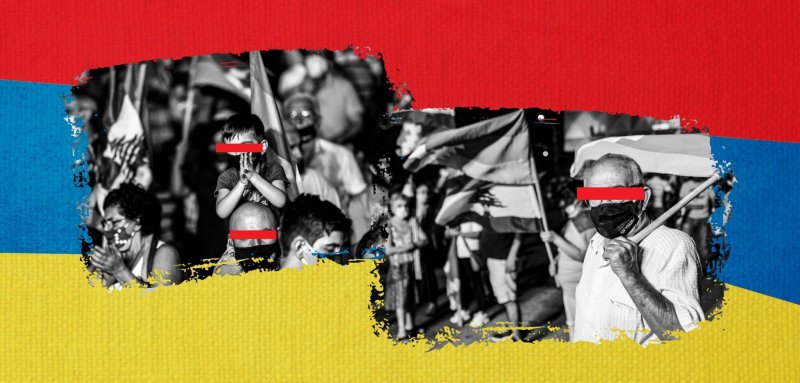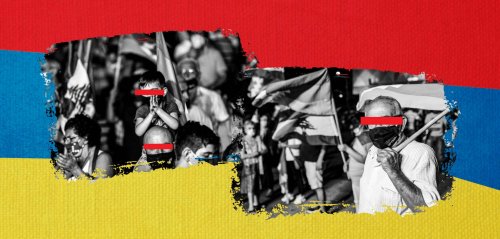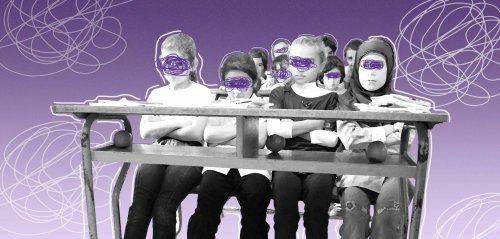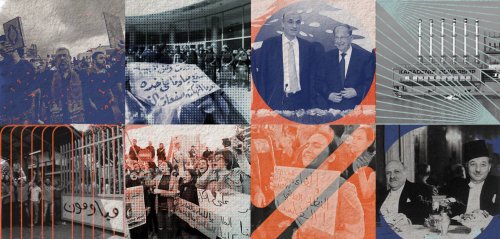The Bourj Hammoud area, north of Beirut, is considered the capital of the Armenians in Lebanon. They had sought refuge in it following the genocides perpetrated against them at the hands of the Ottomans at the turn of the last century, and for many years, it remained, along with some of the surrounding areas, witness to a unique experience in the world of economy, finance, trade, and industry. When you go to these areas, you see the overwhelming Armenian presence through the names of the streets, the shops, and institutions, in addition to school facilities, clubs, and scouts among others.
Over time, especially in the last ten years, the region’s features began to change. What became clear was not the decline of the Armenian presence in and of itself, but what the successive crises had done to them, and what they have done in their areas over the years, by closing dozens of institutions there, and the migration of young people to countries abroad, especially with the exacerbation of the political and economic crisis in Lebanon after 2019, and this was accompanied by the emergence of many communities of different nationalities in that region at the expense of the Armenian presence.
Shattered dreams
Karo Ibram Bekarian, a Lebanese industrialist of Armenian descent, tells Raseef22 the story of closing down the factory that had changed his life. He says, “I started my factory making women leather bags. Hand in hand with my wife, we started our small business from home. Over time, as the business grew, we ended up becoming an establishment with 17 workers. We started off very well and our financial situation improved. I had a room and a small courtyard, and I then bought a house and a car for me and another for my wife, and all this was due to our hard work and our blood, sweat, and tears.”
In the last ten years, the region’s features began to change. What became clear was not the decline of the Armenian presence in and of itself, but what the successive crises had done to them
A series of successive crises — starting with the assassination of Prime Minister Rafic Hariri in 2005, then the July War in 2006, accompanied by security upheavals and assassinations that shook the country — have put a heavy strain on Karo and his factory along with the families it fed, but he insisted on continuing his unique journey until the great collapse took place in 2019. He points out that the banks issue and the Beirut port explosion have completely destroyed all his dreams. He was not able to hold out against them, and was forced to close the factory for good.”
From owning a factory that makes purses to working from home just to make ends meet, Karo tells of the great responsibilities placed on his shoulders that force him to defy these challenging circumstances, saying, “Today I work from my house, making purses in order to make a living and not be degraded to others, since we have a great responsibility. I have sold my house and cars and we always thank God that I am still dependent on myself, and I think that the largest percentage of the Lebanese people suffer from the same problem. I am just fighting to secure my family’s livelihood, from housing to food and medicine. Life has become very difficult.”
Immigration is the solution?
Georgick Mano Papazian, a young Lebanese man of Armenian origin, could not bear the difficult situation in Lebanon, so he traveled to Spain in search of a decent life there, but he did not last long and returned to Lebanon. However the idea of traveling still haunts him every day.
Georgick tells Raseef22 why he insists on traveling, “I am thinking of traveling abroad for my future, because in Lebanon there’s no future and there’s no work. I applied for asylum in Spain, arrived in Malaga (in the south), and was investigated there but I could not stay because of the language. They do not speak English, French, Armenian, or Arabic, which meant I had to use Google Translate to get anything done in Spanish. In the face of this reality, I returned to Lebanon, and today I am waiting for any opportunity abroad to travel and work, because the situation in Lebanon is no longer tolerable.”
Georgick adds, “The whole of Lebanon is suffering from the crisis and the entire Lebanese people are living through this crisis, including those who are Lebanese of Armenian origin, so many of my friends and people from my region are thinking of traveling every day in search of a better reality.”
Since the first war
With the intensification of Ottoman oppression against Armenian nationalism, and the Ottomans committing the most heinous crimes and types of genocide, the rest of the Armenians were displaced in the east and the west of the earth. Some of them arrived in Lebanon, bringing with them a cultural heritage, multiple talents, industries, and crafts that will enrich any land they reside in, and this is what happened in Lebanon.
“Today I work from my house, making purses in order to make a living and not become degraded to others, since we have a great responsibility. I have sold my house and cars and we always thank God that I am still dependent on myself”
Speaking to Raseef22, Karim Pakradouni, a former minister of Armenian origin, points out that a small number of Armenians came to Lebanon before the massacres, but after the Ottoman genocide, where one and a half million people died in 1915, they began to flee to various directions and countries, including Lebanon, where they settled in large numbers and it became a homeland to them.”
Armenians entered the Lebanese way of life through the economy, and according to Pakradouni, the first factor is due to the fact that Armenians were an organized nation of people and that they belonged to parties. The parties were encouraging work, establishing schools and preserving the Armenian language. The secondary factor is their knowledge of professions. Their presence in the refugee camps in Aleppo for example, taught them different crafts and professions, and when they arrived in Lebanon most of them were craftsmen, and from here they quickly made their way into the economy, and the Lebanese industry flourished when they turned their craft into an industry. For example the shoe repairman developed his profession and became a manufacturer and seller of shoes.
Work and development
Karabid Fikrajian, an economic and legal researcher at the Lebanese Institute for Market Studies who is also of Armenian origin, says that “the main factor is that they came to a place where there is a lot of space to work, and no one prevented them from doing so, and there were no laws preventing them from owning or investing, because they came to Lebanon, which was part of the Sultanate, after which the French Mandate came, in addition to the absence of welfare funds for refugees that push refugees not to work and stay in their places of residence.”
Armenians were an organized nation of people and they belonged to parties, and the parties were encouraging work, establishing schools, and preserving the Armenian language.
He adds, “The Armenians were forced to work in order to secure their livelihood, and from here they started working and developing their professions at a time when the Lebanese environment was conducive to work and productivity, with low taxes and few laws that hinder work. And these people were able, despite the language barrier, to develop themselves and acquire extensive and advanced scientific knowledge.”
Temporary neutrality
The Armenians did not engage in Lebanese political life, remaining neutral since their arrival in Lebanon, and according to Pakradouni, Armenians had a stance that expressed they would not interfere in the internal political affairs in Lebanon. They are with the official state in whatever shape or form it takes; that is, under the presidency of Camille Chamoun, they were Chamoun supporters, and when Fouad Chehab came to power they became Chehab supporters, and this was their main rule until 1975. They were isolated from Lebanese politics, and did not want to be a side in the ongoing conflicts in Lebanon, noting that there was a purely Armenian conflict between the existing Armenian parties.
In 1936, the door to naturalization was opened in Lebanon with the presence of the French. According to Pakradouni, this decision was in order to naturalize the Armenians, meaning that this date marks the main turning point in the political life of Armenians. Before it, they were Armenian refugees, and after it, with the new births in Armenian community, they became Lebanese of Armenian origin.
The Armenians were able to maintain their identity and collectiveness for long periods of time, through scout clubs, Armenian schools, and church, and let’s not forget the language that they pass on from generation to generation, in addition to them living within a specific geographical area and not across the entire Lebanese map. All this has prevented a full integration into Lebanese society, but this matter is no longer the same as it was before. Rather, we are witnessing levels and phases of integration. According to Pakradouni, those who were born in Lebanon and went to non-Armenian schools, quickly became fully integrated into Lebanese society, and today we are facing complete integration, not complete assimilation.
On to politics!
Since we are facing new generations that were born in Lebanon and integrated with Lebanese society, we are now seeing Lebanese of Armenian origin outside the traditional Armenian parties, which was not the case in the past. This means that the Lebanese people of Armenian origin are now behaving as Lebanese citizens despite preserving some collective identity, and it was necessary to enter the Lebanese political arena through Armenian parties or other Lebanese parties.
Speaking to Raseef22, Paula Yacoubian, Lebanese parliament member of Armenian origin, points to the fact that Armenians are part of the Lebanese people and it is normal for them to enter the political arena, and it is normal for them to be part of decision-making, as well as be candidates, voters, and participants in political life.
The reality of the Lebanese of Armenian origin is the saddest in the series of Lebanese sorrows, and the group bears witness to its continuous decline. This reflects the extent of oppression and people’s attempts to travel abroad, most of whom are probably Armenian
Commenting on her political experience, she says, “I entered the political arena not because I am of Armenian origin, but because I am Lebanese and I directly experience and witness the degradation and decline of the state and all its problems like the rest of the Lebanese people, so I decided to take this step when I saw how the Lebanese political parties excluded the opposition, and divided influence, shares, and benefits in the country. They even canceled the idea of competing for good deeds for the benefit of the people and the country, and decided to compete even more in theft, and this is why I made the decision with those who are in opposition to enter (politics) against this authority.”
“The saddest in a series of sorrows”
On the other hand, the series of the immigration of the Lebanese people, whether legal or illegal, is beginning to become evident, and the Armenians — being part of the Lebanese fabric — have begun to emigrate, as evidenced by the low voter turnout in Armenian areas. In this context, Yacoubian asserts that “The reality of the Lebanese people of Armenian origin is the saddest in the latest series of Lebanese sorrows, and the Armenian community bears witness to its continuous decline every four years, and this reflects the extent of the oppression and Lebanese people’s attempts to travel abroad, most of whom are probably Armenians.”
She goes on to say, “The Armenians today, in the wake of parties that led them to the unknown and to the lack of leadership in a way that favors the political authority, have created a policy that is of no use to the people, so that they can stay in their land, schools, and country. Now Armenians have no choice but to emigrate in order to live in a country that respects them.”
For his part, Farkajian points out that the reason that drives Armenians to emigrate is the same one that drives the rest of the Lebanese people to emigrate. Year after year, the situation was becoming increasingly suffocating and then the current crisis came. pushing them to emigrate. The conditions are no longer conducive for investment and self-development so they are looking for that abroad.
There is no doubt that the Lebanese people are accustomed to traveling and emigrating to all corners of the world, but this sample, which we took from a group of Lebanese people, has begun to show signs of decrease in the percentage of voting and general (public) attendance, because their number is somewhat small compared to the rest of the sects. But the same thing is happening with the rest of the sects or environments; mass immigration and a decline in presence, in light of a dire social, political, security, and economic reality; a reality that seems will carry on, and appears to be heading for the worse.
Raseef22 is a not for profit entity. Our focus is on quality journalism. Every contribution to the NasRaseef membership goes directly towards journalism production. We stand independent, not accepting corporate sponsorships, sponsored content or political funding.
Support our mission to keep Raseef22 available to all readers by clicking here!
Interested in writing with us? Check our pitch process here!








